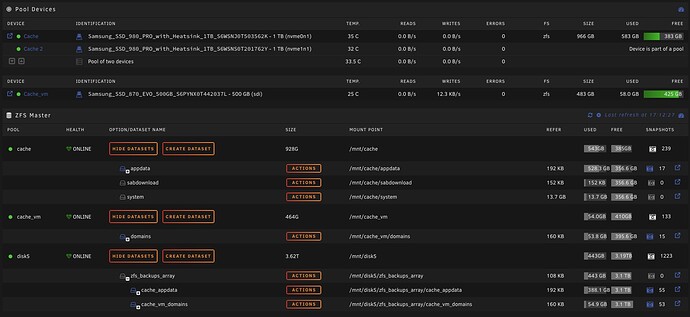Hi guys,
I use UserScripts to prepare/back up appdata (Dockers) and domains (VMs) and then i use Duplicacy to make backups. In Duplicacy i can then restore different versions from a dropdown. This way i can restore specific docker/VM back to Unraid.
I’m an newbie at Duplicacy, Unraid, rsync and tar so maybe this it totally wrong but it works for me.
Please tell me if you have some idea’s on how to improve (or maybe tell me to scrap it all  )
)
DOCKERS
#!/bin/bash
# Get all running containers and store them in $CONTAINERS
mapfile -t CONTAINERS < <( docker inspect --format='{{.Name}}' $(docker ps -q --no-trunc) | cut -c2- )
# show in logrun
echo "Appdata backup started - Starting to shut down dockers"
# Show notification in Unraid (alert, warning, normal)
/usr/local/emhttp/webGui/scripts/notify -s "Notice [Script] -Appdata backup started" -i "normal" -d "Starting to shut down dockers"
# Stop all running containers
for container in "${CONTAINERS[@]}"; do
echo "Stopping ${container}..."
docker stop ${container} 1> /dev/null
done
# show in logrun
echo "Dockers shutted down. Starting backup"
# Show notification in Unraid (alert, warning, normal)
/usr/local/emhttp/webGui/scripts/notify -s "Warning [Script] -Appdata backup running" -i "warning" -d "Dockers shutted down. Starting backup"
# Backup appdata
echo "Backing up /mnt/user/appdata/"
rsync -a --delete /mnt/user/appdata/ /mnt/user/backups/appdatabackups/
# Show notification in Unraid (alert, warning, normal)
/usr/local/emhttp/webGui/scripts/notify -s "Warning [Script] -Appdata backup running" -i "warning" -d "Backup done. Starting dockers"
# Start all containers that were previously running
for container in "${CONTAINERS[@]}"; do
echo "Starting ${container}..."
docker start ${container} 1> /dev/null
done
# show in logrun
echo "Dockers started. Starting to tar files"
# Show notification in Unraid (alert, warning, normal)
/usr/local/emhttp/webGui/scripts/notify -s "Warning [Script] -Appdata backup running" -i "warning" -d "Dockers started. Starting to tar files"
# Compress appdata and remove original folders
find /mnt/user/backups/appdatabackups/ -type d -maxdepth 1 -mindepth 1 -exec tar zcvf {}.tar.gz {} --remove-files \;
# show in logrun
echo "Appdata backup done - Ready to do Duplicacy backup"
# Show notification in Unraid (alert, warning, normal)
/usr/local/emhttp/webGui/scripts/notify -s "Notice [Script] - Appdata backup done" -i "normal" -d "Ready to do Duplicacy backup"
VMs
#!/bin/bash
#Empty vm list
echo "" > /tmp/vms-running.txt
# show in logrun
echo "VMs backup started - Starting to shut down VMs"
# Show notification in Unraid (alert, warning, normal)
/usr/local/emhttp/webGui/scripts/notify -s "Notice [Script] -VMs backup started" -i "normal" -d "Starting to shut down VMs"
#Get all running vms except VM-TO-NOT-SHUTDOWN server
for VM in $(virsh list --state-running --name); do
if [[ ! "$VM" == "VM-TO-NOT-SHUTDOWN" ]] ; then
virsh shutdown "$VM"
#Write running vms to list
echo "$VM" >> /tmp/vms-running.txt
fi
done
# sleep if no vm is started to get next notice
sleep 5
# show in logrun
echo "VMs shutted down. Starting backup"
# Show notification in Unraid (alert, warning, normal)
/usr/local/emhttp/webGui/scripts/notify -s "Warning [Script] -VMs backup running" -i "warning" -d "VMs shutted down. Starting backup"
# Backup appdata
echo "Backing up /mnt/user/domains/"
rsync -a --delete /mnt/user/domains/ /mnt/user/backups/vmbackups/
# Show notification in Unraid (alert, warning, normal)
/usr/local/emhttp/webGui/scripts/notify -s "Warning [Script] -VMs backup running" -i "warning" -d "Backup done. Starting VMs"
#Get all running vms except backup server
for VM in $(cat /tmp/vms-running.txt); do
virsh start "$VM"
done
# show in logrun
echo "VMs started. Starting to tar files"
# Show notification in Unraid (alert, warning, normal)
/usr/local/emhttp/webGui/scripts/notify -s "Warning [Script] -VMs backup running" -i "warning" -d "VMs started. Starting to tar files"
# Compress appdata and remove original folders
find /mnt/user/backups/vmbackups/ -type d -maxdepth 1 -mindepth 1 -exec tar zcvf {}.tar.gz {} --remove-files \;
# show in logrun
echo "VMs backup done - Ready to do Duplicacy backup"
# Show notification in Unraid (alert, warning, normal)
/usr/local/emhttp/webGui/scripts/notify -s "Notice [Script] - VMs backup done" -i "normal" -d "Ready to do Duplicacy backup"


